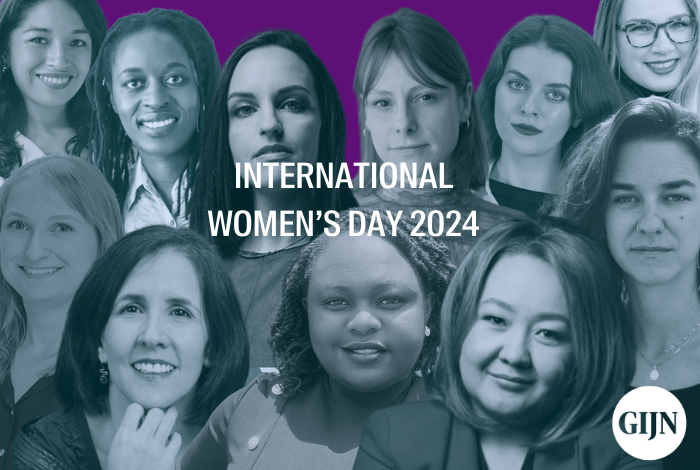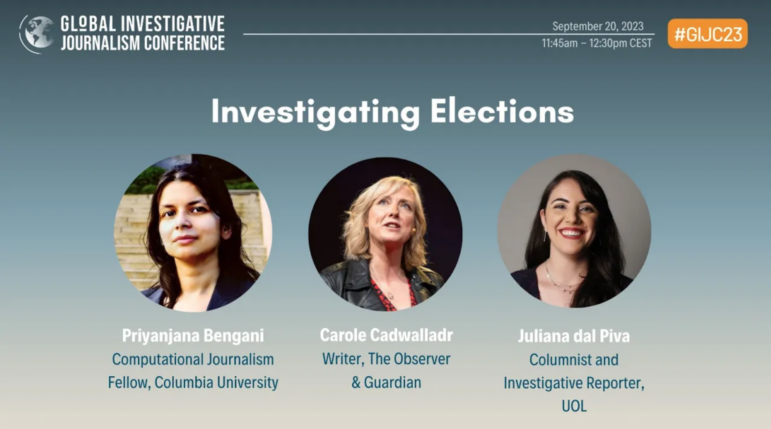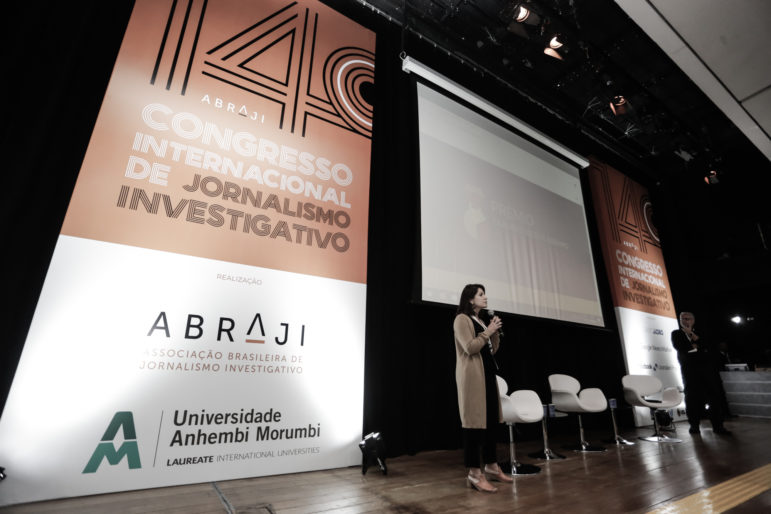

Juliana Dal Piva speaking during the Global Investigative Journalism Conference in Sweden in 2023. Image: Heino Ollin for GIJN
‘Silenced’: Brazilian Investigative Journalist Juliana Dal Piva on Facing Threats from Her Reporting
The podcast Silenced, from the freedom of speech organization Article 19, tells the stories of journalists and activists around the world who have come up against government attempts to rein them in, or silence them.
In the latest episode, host Nicola Kelly spoke to the Brazilian investigative journalist Juliana Dal Piva, whose reporting put her on a collision course with the supporters of then-President Jair Bolsonaro, the military, as well as with commercial elites close to him.
As Kelly says on the podcast, Dal Piva is a journalist and columnist “known throughout her native Brazil for investigations she’s done into former president Jair Bolsonaro… who swept to power in 2019 and quickly became known as ‘Brazil’s Donald Trump,’ or the ‘Trump of the tropics.’
Dal Piva speaks about the personal and professional ramifications that came from her reporting, the death threats she has faced, and why she believes that journalists play such a vital role in holding power to account.
Editor’s Note: The transcript is republished with permission, and has been abridged. You can listen to the full version here.
Nicola Kelly: It all started in 2021 as Brazil was emerging from the global pandemic. Juliana had been making a podcast series investigating Bolsonaro and his family called The Secret Life of Jair.
JDP: This podcast has all the reporting that I did since 2018 about how Bolsonaro built his public life with a bunch of lies… [and] how he bought many apartments, land, with cash. He actually paid in cash and we have the proof of that. I report all this on the podcast…
NK: Hours after the podcast episode was published, Juliana received a WhatsApp message from Frederick Wassef, President Bolsonaro’s lawyer. It said that she was an enemy of Brazil, and that if she was working in a different country, her body would disappear, an unambiguous threat from someone directly connected to Bolsonaro.
JDP: I shared this with editors, a few lawyers who were friends. They all wanted [me] to go to make a criminal charge against him and decide that we should turn that public, because this was not isolated. They knew the other stuff that happened before, and if we get quiet and accept that, what else do we have to accept after this?
NK: Juliana and her colleagues decided to publish a written piece online, including the message itself.
JDP: So we published one report about this, and informed many press organizations. And then he started to attack me in interviews… He said that that message was “off the record.”
NK: This is the irony of using a platform like WhatsApp or using any kind of social media is that it’s not regulated in the same way as a conversation between a journalist and a source… So why do you think he issued this series of threats on WhatsApp, which is entirely traceable and that you could use as strong evidence against him?
JDP: I think he was very confident about himself, because he is actually really powerful, he was one of the most important advisors of the President at that moment, the president of Brazil. He used to help Bolsonaro choose who’s going to the Supreme Court. He’s part of that, and many important decisions.
NK: Do you think he felt untouchable?
JDP: He felt totally untouchable. He thought I was going to do nothing, and he did a few harassments to other journalists too. When we published the message with the threat, another colleague from another newspaper wrote on X that once — to complain about a story she did — he actually took her by the arm and put her inside of a car to complain… So it’s his behavior.
NK: Just going back to what you said, you think the reason why he contacted you and issued these threats on WhatsApp is because he thought you wouldn’t do anything. Did you ever consider doing nothing, or was that not an option?
JDP: This was important for me as a journalist. It was an important moment for me in my career. Was I supposed to just accept the threat and stop reporting?
NK: It wasn’t the first time Juliana had been threatened by Wassef, but it was the first time she had proof. A couple of years earlier, when she was working on another piece about Bolsonaro, she had asked the then-president’s lawyer for a comment, known as a right-to-reply, ahead of publication. Standard procedure in any reporting, not least for criminal investigation.
JDP: And at some point, he said to me, you feel so powerful inside of this beautiful building of the paper, but when you go to the street, you’re just like everyone else, you can be shot in the head, because Rio is a very violent city, and the president is working very hard to solve this, but you guys are making problems for him. And I heard that and thought to myself, for a few seconds, did he really say that? You don’t believe that this has happened.
NK: What did you say? What did you respond? You were probably in shock?
JDP: Yeah, I got in shock. And I just kept listening to what he was saying, because he started to say something else. So he threatened me with this for the first time without saying [it] directly. You know, it was direct, but not direct, see? And it took me a few minutes to understand what happened, and then I went to my editor and told him about it. Because this was not an interview, so I was not recording, I just answered my phone because he was going to say yes or no for an interview, you’re not expecting to be threatened on the phone by the president’s lawyer. You’re not expecting that… I told my editor, and we both talked a while about this [and decided] from now on, we record everything he says. We’ll be very careful about him, and let’s pay attention to everything.
NK: So Juliana was pretty familiar with strong pushback from Bolsonaro and his administration. But rather than putting her off, rather than deterring her, it made her all the more determined to get to the truth and to expose corruption at the highest levels of government. That was why she wanted to be a journalist in the first place.
JDP: I’m 38 years old. We had a military dictatorship until 1985, that lasted 21 years. I was born in 1986 so the very beginning of our democracy, the country that I know, the country that I was born and raised in and became a journalist [in] was a democracy. But a democracy is something you build. It’s not something that is done after you do a constitution. It’s there, you have to actually build every day, especially in a country like Brazil with so many problems, structural problems… And I became a journalist believing in that.
Dal Piva was on one of the panels at the GIJC 2023 in Gothenburg, Sweden.
NK: Julianna first started noticing threats on social media in early 2019 at first, these were targeting her friends and colleagues at other newspapers, slanderous attacks online, which she sensed would soon be directed towards her.
JDP: I got my first death threat in April of 2019, because of a story that I wrote. It was not about Bolsonaro, but it was about a movie. It was a very small story. It wasn’t even so important.
NK: The film was about the military dictatorship, and her piece pointed out historical mistakes the producers had made. Shortly after that, she received a death threat on Twitter.
JDP: The message was something like, “You are going to die.” This person wrote to me from one anonymous account actually saying this: “You are going to die.”
NK: She began to notice a pattern to the type of messages she was getting.
JDP: Besides the threat there were thousands and thousands of messages greeting me and all, all of the content is very misogynous. It’s very against women. For us as women journalists, you have to be strong, right? You can’t cry, you can’t be weak, you can’t be afraid. This is not an option. None of this is an option. Because if you feel the punch, they’re going to use that against you, too. So that’s why, for example, at first, I have done nothing. I didn’t want to go to the police, I didn’t want to do anything about it. I just want that to disappear. And that was a mistake at that moment, I should have gone to the police and register [the abuse] and made him — made these people — pay for what they write. I should have done that, but it took me a few months to understand that this was not an isolated case and the worst was coming.
NK: Worried about the threats, she decided to create a personal protocol to protect herself and her family.
JDP: For example, I asked my parents and my brother and my sister to change their name on social media because I have an uncommon last name, so it’s not difficult for someone to see that we are related. And I was married before — I’m divorced now — but for a very long time, all of my bills were in my ex-husband’s name because I didn’t want to have my address on anything, because sometimes one of the attacks they promote is putting an address on the internet. I never post where I am, you know, because I was not feeling secure, there were so many attacks to journalists that I didn’t want to be in that position. So I tried to anticipate all of the things, but it doesn’t matter, they find another way to attack you.
NK: Fast forward a few years to 2022 after Juliana’s article went live, exposing Wassef and his threats against her, a long, arduous, and costly battle began in the court. It ended with Juliana being convicted for violating his privacy.
JDP: I was actually convicted for violating his privacy, in the civil lawsuit. We did a criminal charge [about] the threat, and also I filed a civil lawsuit against him for damages, because it’s really difficult to have someone convicted on criminal charges by threat in Brazil. The only way courts actually rule in your favor when you’re threatened is when someone says to you, “I’m going to kill you.” Otherwise, this is not a threat. So it’s very complicated, because the ones who are a little bit smart don’t say this directly.
NK: It’s still a threat, but it’s not direct.
JDP: Exactly. So it’s a crime [that’s] very difficult to prove. So I was advised by many organizations to file for damages, to fight against him in court, to make this public, to make everybody know that he was doing that to me.
NK: But this wasn’t only a devastating ruling for Juliana herself, but also for press freedom in general.
JDP: Because it could be a precedent for other journalists. So when you’re threatened, you can’t publish the message with the threat. If you’re threatened by a message on your phone, you cannot make this public because you’re violating someone else’s privacy. But in our law, we do not need the permission of the other person to publish anything you know, like a message between you and me here, I consent. It’s your problem if you wrote something you shouldn’t.
NK: Then in April 2023, Juliana went back to court for an appeal hearing on the ruling, and this time she won.
JDP: It was unanimous. It was a very important ruling, not only for me, but for all journalists, because they recognized when a journalist is threatened, we have the right to make it public for our safety.
NK: Wassef appealed and the case will be heard by the Supreme Court, but Juliana thinks his chances of winning on appeal are low.
JDP: He has no way to run from the conviction. He will have to pay me, and I didn’t actually ask [for] a lot of money. I asked for $4,000 something like that, because I was not after money. And I even put in my petition that this is going for the nation, for other media outlets, communities in Rio, because I was not after the money. I was just after my safety…
NK: The battle for freedom, not only for her, but for all journalists in Brazil is ongoing.
JDP: They are trying to create a narrative to say that everything is fraud. They are being persecuted because they are from the right. And the journalists of the press are all communists. They believe in these kinds of conspiracy theories, you know. So they will keep saying those things, they will be there. They’re not just going to disappear. I think one of the worst things about Bolsonaro is that it’s not about him. It’s about the evolution of the extreme right. He’s a symbol of them, and this is not about him anymore. It’s what… they represent. They represent an idea in a world that doesn’t respect women, doesn’t respect Black people, they don’t want any democracy. They want a dictatorship. This is what they want. They want us, all of us, to live under their rules.
NK: And while she has faced significant challenges, the hardest part has been the impact it’s had on her family.
JDP: When you’re living this, your family lives this with you, so they also get scared. They also get afraid of all that. You know, I think the worst part for me is to have them live this experience with me. If this was only me myself dealing with [it], but I can’t protect them from actually seeing this happen with me. I think it’s the worst. The worst part is this — they feel, they feel a lot about this whole thing.
 Presented by Nicola Kelly, the Silenced podcast features stories from journalists around the world who risk it all to report the truth.
Presented by Nicola Kelly, the Silenced podcast features stories from journalists around the world who risk it all to report the truth.









